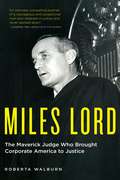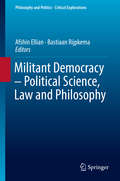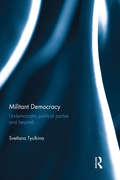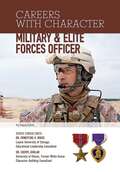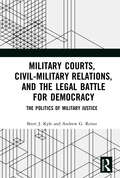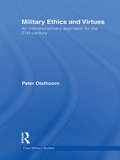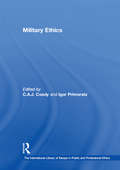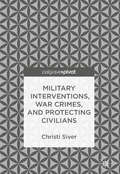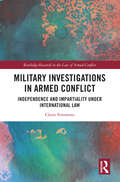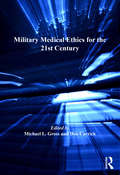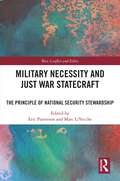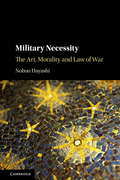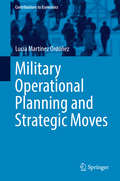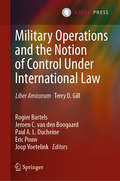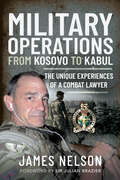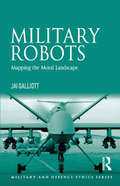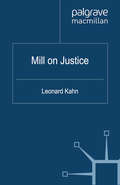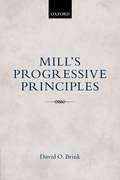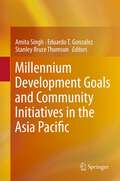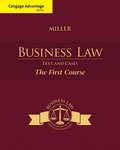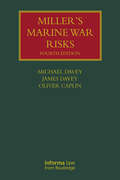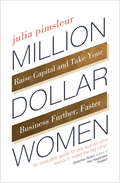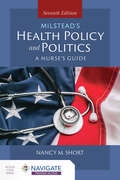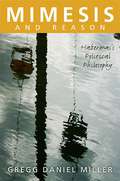- Table View
- List View
Miles Lord: The Maverick Judge Who Brought Corporate America to Justice
by Roberta WalburnThis is the story of Miles Lord (1919–2016), who rose from humble beginnings on Minnesota&’s Iron Range to become one of the most colorful and powerful judges in the country, described as &“an unabashed Prairie populist&” and &“a live-wire slayer of corporate behemoths.&” He cut a wide swath through history on his path to the bench: coming of age alongside a cadre of young Midwestern social-gospel progressives, including Hubert H. Humphrey, Eugene McCarthy, and Walter Mondale, in the days before they reached national fame; teaming with Bobby Kennedy as a hotshot prosecutor in pursuit of Jimmy Hoffa; and serving as the secret envoy between his friends Hubert and Eugene in their battle for the soul of the Democratic party in the historic 1968 presidential campaign. Later, after donning his black robe, he reshaped jurisprudence with precedent-breaking rulings—on issues ranging from women&’s rights to consumer protection to education reform—and breaking trail when he ordered the shutdown of the Reserve Mining Company in northern Minnesota, which was spewing its waste into Lake Superior, in the most sensational trial of the early environmental era.One of Judge Lord&’s landmark cases—and interlaced as a centerpiece narrative of this book—involved the Dalkon Shield intrauterine device, which caused horrific infections in thousands of women, resulting in infertility and sometimes death. Author Roberta Walburn served as the judge&’s law clerk during that litigation in 1983–84, and she provides a page-turning account (both an insider&’s view and an in-depth chronicle) of what was called &“one of the most disastrous episodes of American corporate misconduct.&” In the end, more than 200,000 women received nearly $3 billion in compensation, and the Fortune 500 defendant was left in ruins. But Judge Lord was hauled up on judicial misconduct charges for his no-holds-barred actions that were certainly provocative but also stand as a timely reminder, even (or especially) today, of the challenges in balancing the scales of justice for a legal system that too often skews to the rich and powerful.The author deftly weaves the Dalkon Shield drama into the larger story of the life of a one-of-a-kind man, crafting a sweeping and spirited true-life tale with not only her first-hand experiences as the judge&’s law clerk but also with unrestricted access to the judge&’s personal files. This is a rare and compelling portrait of a remarkable man and his place in both Minnesota and U.S. history.
Militant Democracy – Political Science, Law and Philosophy (Philosophy and Politics - Critical Explorations #7)
by Afshin Ellian Bastiaan RijpkemaThis volume offers an up-to-date overview of the much-debated issue of how a democracy may defend itself against those who want to subvert it. The justifications, effectiveness and legal implications of militant democracy are discussed by addressing questions as: How can militant democracy measures such as party bans be justified? Why is it that some democracies ban antidemocratic parties? Does militant democracy succeed in combatting right-wing extremism? And is militant democracy evolving into an internationalized legal and political concept?Bringing together experts and perspectives from political science, law and philosophy, this volume advances our understanding of the current threats to democracy, a political system once thought almost invincible. It is especially timely in the light of the rise of illiberal democracy in the EU, the increasingly authoritarian rule in Turkey, the steady shift to autocracy in Russia and the remarkable election of Trump in the US.
Militant Democracy: Undemocratic Political Parties and Beyond
by Svetlana TyulkinaThe term ‘militant democracy’ was coined by Karl Loewenstein in the 1930s. He argued that attempts to establish democracy in the Weimar Republic failed due to the lack of militancy against subversive movements. The concept of militant democracy was introduced to legal scholarship and constitutional practice so as to provide democracy with legal means to defend itself against the range of possible activities of non-democratic political actors. This book offers a broad comparative look at the legal concept of militant democracy. It analyses both theoretical and substantive aspects of this concept, investigating its practice in a number of countries and on a diverse array of issues. Examining cases in Australia, Turkey, Spain, Germany, Israel, India, the USA, and the Council of Europe, Svetlana Tyulkina maps the historical development of militant democracy in constitutional theory and explores its interaction with various traditional and contemporary notions of democracy. The book analyses the possibilities and pitfalls of the concept of militant democracy when applied to protect democracy when it is under threat of harm or destruction by undemocratic actors, and suggests possible solutions and measures to overcome those dangers. In its evaluation of the capacity and justification for democracies to apply militant democracy measures, this book will be of great use and interest to students and scholars of public comparative constitutional law, international law, human rights law, and comparative politics.
Military & Elite Forces Officer (Careers With Character #18)
by Joyce LibalFind out what it takes to be a member of the military... The military has several branches: *Army, *Navy, *Air Force, and *Marines. Each branch offers a wide variety of opportunities, including the elite forces. Do you think you might like to dedicate a portion of your life to the service of your country? The major requirement for military service is strength of character; that means you must posses qualities like trustworthiness... Respect... Responsibility... Fairness... And citizenship. If these traits are yours, a career in the military may interest you--and it could lead to successful civilian employment as well. Military & Elite Forces Officer will tell you how.
Military Courts, Civil-Military Relations, and the Legal Battle for Democracy: The Politics of Military Justice
by Andrew G. Reiter Brett J. KyleThe interaction between military and civilian courts, the political power that legal prerogatives can provide to the armed forces, and the difficult process civilian politicians face in reforming military justice remain glaringly under-examined, despite their implications for the quality and survival of democracy. This book breaks new ground by providing a theoretically rich, global examination of the operation and reform of military courts in democratic countries. Drawing on a newly created dataset of 120 countries over more than two centuries, it presents the first comprehensive picture of the evolution of military justice across states and over time. Combined with qualitative historical case studies of Colombia, Portugal, Indonesia, Fiji, Brazil, Pakistan, and the United States, the book presents a new framework for understanding how civilian actors are able to gain or lose legal control of the armed forces. The book’s findings have important lessons for scholars and policymakers working in the fields of democracy, civil-military relations, human rights, and the rule of law.
Military Ethics and Virtues: An Interdisciplinary Approach for the 21st Century (Cass Military Studies)
by Peter OlsthoornThis book examines the role of military virtues in today's armed forces.Although long-established military virtues, such as honor, courage and loyalty, are what most armed forces today still use as guiding principles in an effort to enhance the moral behavior of soldiers, much depends on whether the military virtues adhered to by these militaries suit a particular mission or military operation. Clearly, the beneficiaries of these military virtues are the soldiers themselves, fellow-soldiers, and military organizations, yet there is little that regulates the behavior of soldiers towards civilian populations. As a result, troops trained for combat in today's missions sometimes experience difficulty in adjusting to the less aggressive ways of working needed to win the hearts and minds of local populations after major combat is over. It can be argued that today's missions call for virtues that are more inclusive than the traditional ones, which are mainly about enhancing military effectiveness, but a convincing case can be made that a lot can already be won by interpreting these traditional virtues in different ways. This volume offers an integrated approach to the main traditional virtues, exploring their possible relevance and proposing new ways of interpretation that are more in line with the military tasks of the 21st century.The book will be of much interest to students of military ethics, philosophy, and war and conflict in general.
Military Ethics: Theoretical And Practical Issues For The 21st Century (The International Library of Essays in Public and Professional Ethics)
by Igor PrimoratzRecent developments such as the 'new wars' or the growing privatisation of warfare, and the ever more sophisticated military technology, present the military with difficult ethical challenges. This book offers a selection of the best scholarly articles on military ethics published in recent decades. It gives a hearing to all the main ethical approaches to war: just war theory, consequentialism, and pacifism. Part I includes essays on justice of war (jus ad bellum), focussing on defence against aggression and humanitarian armed intervention, but also addressing topics such as conscientious objection and the relation of patriotism to war. Articles in Part II deal with the central problems of justice in war (jus in bello): civilian immunity and 'collateral damage' to civilian life and property. Essays in Part III look into the moral issues facing the military as a profession, such as the civil - military relations, the responsibilities of officers to their soldiers and to their military superiors, and the status and responsibilities of prisoners of war.
Military Interventions, War Crimes, and Protecting Civilians
by Christi SiverWar crimes have devastating effects on victims and perpetrators and endanger broader political and military goals. The protection of civilians, one of the most fundamental norms in the laws of war, appears to have weakened despite almost universal international agreement. Using insights from organizational theory, this book seeks to understand the process between military socialization and unit participation in war crimes. How do militaries train their soldiers in the laws of war? How do they enforce compliance with these laws? Drawing on evidence from the Korean War, the Malayan Emergency, and the Canadian peacekeeping mission in Somalia, the author discovers that military efforts to train soldiers about the laws of war are poor and leadership often sent mixed signals about the importance of compliance. However, units that developed subcultures that embraced these laws and had strong leadership were more likely to comply than those with weak discipline or countercultural norms.
Military Investigations in Armed Conflict: Independence and Impartiality under International Law (Routledge Research in the Law of Armed Conflict)
by Claire SimmonsAn allegation is made that a war crime was committed by a soldier during a conflict. Who should investigate the allegation? How should they investigate?This book explores a topic of critical importance in legal and policy discussions surrounding the accountability of military operations in armed conflict, and problematises some presumptions that are often made about the topic. The work provides the international legal framework necessary to address these questions and establishes the precise standards of independence and impartiality as applicable to investigations in armed conflict. It questions the assumption that the standards of independence and impartiality of investigations should be measured in the same way that we measure these standards for judges, courts, and tribunals. It also explores the ways in which military institutions and culture, as well as the context of armed conflict, may impact on the effectiveness of investigations or the perception of justice by those affected. By demonstrating the precise ways in which military investigations can contribute to or hinder the effectiveness of investigations, the book clarifies States’ responsibilities with regard to their accountability efforts for serious violations of international law in armed conflict. The work will be a valuable resource for academics, researchers, and policy-makers working in the areas of international humanitarian law, international human rights law, as well as political science and military ethics.
Military Justice in the Modern Age
by Alison Duxbury Matthew Groves Duxbury, Alison and Groves, MatthewMilitary justice systems across the world are in a state of transition. These changes are due to a combination of both domestic and international legal pressures. The domestic influences include constitutional principles, bills of rights and the presence of increasingly strong oversight bodies such as parliamentary committees. Military justice has also come under pressure from international law, particularly when applied on operations. The common theme in these many different influences is the growing role of external legal principles and institutions on military justice. This book provides insights from both scholars and practitioners on reforms to military justice in individual countries (including the UK, Canada, the Netherlands and Australia) and in wider regions (for example, South Asia and Latin America). It also analyses the impact of 'civilianisation', the changing nature of operations and the decisions of domestic and international courts on efforts to reform military justice.
Military Medical Ethics for the 21st Century (Military and Defence Ethics)
by Michael L. Gross Don CarrickAs asymmetric ’wars among the people’ replace state-on-state wars in modern armed conflict, the growing role of military medicine and medical technology in contemporary war fighting has brought an urgent need to critically reassess the theory and practice of military medical ethics. Military Medical Ethics for the 21st Century is the first full length, broad-based treatment of this important subject. Written by an international team of practitioners and academics, this book provides interdisciplinary insights into the major issues facing military-medical decision makers and critically examines the tensions and dilemmas inherent in the military and medical professions. In this book the authors explore the practice of battlefield bioethics, medical neutrality and treatment of the wounded, enhancement technologies for war fighters, the potential risks of dual-use biotechnologies, patient rights for active duty personnel, military medical research and military medical ethics education in the 21st Century.
Military Necessity and Just War Statecraft: The Principle of National Security Stewardship (War, Conflict and Ethics)
by Eric PattersonThis book analyses the concept of military necessity and just war thinking, and argues that it should be seen as a vital moral principle for leaders. The principle of military necessity is well-understood in the manuals of modern militaries and is recognized in the war convention. It is the idea that battlefield commanders should make every effort to win on a local battlefield, within legal means, and using proportionate and discriminating weapons and tactics. Every legal textbook on war includes military necessity as a foundational principle within the jus in bello (ethics of fighting war) alongside principles of proportionality and distinction, and it is taught in every Western military academy. Even the International Committee of the Red Cross lauds the concept as a cardinal principle of warfare. However, unlike legal scholarship, pick up a book by almost any just war thinker in philosophy, theology, or the social sciences, and the concept is missing altogether. This volume returns military necessity to just war thinking and lays out the argument for doing so. Each contributor taps into one of the many dimensions of military necessity, such as its relationship to jus ad bellum (ethics of going to war) categories (e.g. right intention), its relationship to jus in bello categories, or its application in foreign policy and military doctrine. Case studies in the book point out the practical moral dimensions of military necessity in cases from the targeted killing of terrorists to battlefield decisions that led to the use of the atomic bomb at Hiroshima. This book will be of interest to students of just war theory, military ethics, statecraft and International Relations.
Military Necessity: The Art, Morality and Law of War
by Nobuo HayashiWhat does it mean to say that international humanitarian law (IHL) strikes a realistic and meaningful balance between military necessity and humanity, and that the law therefore 'accounts for' military necessity? To what consequences does the law 'accounting for' military necessity give rise? Through real-life examples and careful analysis, this book challenges received wisdom on the subject by devising a new theory that not only reaffirms Kriegsräson's fallacy but also explains why IHL has no reason to restrict or prohibit militarily unnecessary conduct on that ground alone. Additionally, the theory hypothesises greater normative significance for humanitarian and chivalrous imperatives when they conflict with IHL rules. By combining international law, jurisprudence, military history, strategic studies, and moral philosophy, this book reveals how rational fighting relates to ethical fighting, how IHL incorporates contrasting values that shape its rules, and how law and theory adapt themselves to war's evolutions.
Military Operational Planning and Strategic Moves
by Lucía Martínez OrdóñezThis book employs game theory to warfare and in particular to military operations. It aims at scrutinizing the validity of the two ideas that have governed the literature on war and warfighting: One is the Clausewitzian Fog of War, which suggests that he who is able to "see" through the gunsmoke and observe his opponent’s moves before he has to commit to some strategy himself, should be able to gain an advantage over that enemy; the other is the tradition of understanding military conflict as a zero-sum game. Combined, these ideas seem to imply that war always gives rise to a second-mover advantage. This book questions the validity of this presumption at the operational level of military planning. It provides a simple but rigorous game-theoretic framework in order to analyse operational alternatives for a whole range of typical conflicts Western military forces are facing, including the most recent ones such as Anti-Access/Area-Denial and supporting host nations' counterinsurgency campaigns.
Military Operations and the Notion of Control Under International Law: Liber Amicorum Terry D. Gill
by Paul A. L. Ducheine Joop Voetelink Rogier Bartels Jeroen C. van den Boogaard Eric PouwThis book is a tribute to the work of Professor Terry Gill, offered to him by friends and colleagues who are also academics and/or practitioners in the field of International Law of Military Operations (ILMO).ILMO is a distinct sub-discipline within public international law and domestic public law, covering all domains of military operations: land, sea, air and (cyber)space. As such, ILMO includes elements of other branches of public international law, such as international humanitarian law, human rights law, the law on the use of force, the law of the sea, the law of State responsibility, arms control law and the law of international organisations. Importantly, as a hybrid field of law, ILMO covers the legal basis for military deployment both nationally and internationally, as well as the subsequent international legal regimes applicable to the forces (once deployed) and the domestic administrative and constitutional issues related to the relevant forces.Control is a central notion of ILMO and is the leading theme of this book. The contributions in this book reflect the variety of legal frameworks applicable to military operations and offer an insightful view into the various legal and factual roles of control. The legal notion of control is considered, inter alia, in relation to restraints in the decision to deploy military forces and the legal basis for doing so. The impact of control is also discussed in relation to State and command responsibility and in different situations, including during peace operations, occupation and other situations of armed conflict. Additionally, control is considered over the armed forces themselves, over detainees migrants at sea and over the type or scale of force used in military operations, through targeting rules or rules of engagement. Furthermore, the book contains several discussions of control in the case law of international courts, within arms control law, weapons law and in the context of autonomous weapons systems.The editors of the book are all practitioners, academically affiliated to the Faculty of Military Sciences (War Studies) of the Netherlands Defence Academy and/or the Law Faculty of the University of Amsterdam.
Military Operations from Kosovo to Kabul: The Unique Experiences of a Combat Lawyer
by James NelsonIn this highly unusual role for a lawyer, the author found himself in 1998 having to learn on his feet at a frightening pace as the newly promoted senior legal advisor to the charismatic General Sir Mike Jackson, the commander who led the Allied Rapid Reaction Corps into strife-torn Kosovo the following year to restore some sort of normality in the aftermath of the NATO bombing campaign. A peace deal was finally signed, only for Russia to intervene at the eleventh hour. The author was asked to provide rules of engagement for NATO to eject a stubborn Russian unit from Pristina by force, amongst fears of starting World War III, one of the few occasions when he thought perhaps civilian legal practice might not have been such a bad idea after all. Ten years later the author was back at HQ ARRC, promoted to Colonel. The culture shock on this occasion was not so much, spending six months in Afghanistan as being professionally embedded in a large American military legal office led by a hyper energetic US officer from the 'deep south'. Unlike the short, sharp Kosovo experience in central Europe, this war in central Asia was the longest in the history of the USA, although for the British it was just the latest in a succession of operations going back two centuries to the 'Great Game'. Trying to apply the law, balancing the need for aggression with compliance with Western notions of human rights, and vain efforts to win over the hearts and minds of a proud but impoverished people historically blighted by conflict proved to be unimaginably fraught. Military Operations From Kosovo to Kabul is one experienced soldier’s fascinating account of these historic events, seen on the ground from the perspective of a legal professional, seldom associated with fighting wars.
Military Robots: Mapping the Moral Landscape (Military and Defence Ethics)
by Jai GalliottPhilosophers have wrestled over the morality and ethics of war for nearly as long as human beings have been waging it. The death and destruction that unmanned warfare entails magnifies the moral and ethical challenges we face in conventional warfare and everyday society. Intrinsically linked are questions and perennial problems concerning what justifies the initial resort to war, who may be legitimately targeted in warfare, who should be permitted to serve the military, the collateral effects of military weaponry and the methods of determining and dealing with violations of the laws of war. This book provides a comprehensive and unifying analysis of the moral, political and social questions concerning the rise of drone warfare.
Mill on Justice (Philosophers in Depth)
by L. KahnJohn Stuart Mill was one of the most important figures in political philosophy but little has been published on his ideas on justice. This impressive collection by renowned Mill scholars addresses this gap in Mill studies and theories of justice.
Mill's Progressive Principles
by David O. BrinkIn Mill's Progressive Principles David Brink provides a systematic reconstruction and assessment of John Stuart Mill's contributions to the utilitarian and liberal traditions, examining his first principles and their application to issues of representative democracy and sexual equality. Brink defends novel interpretations of key elements in Mill's moral and political philosophy, including his concepts of motivation, happiness, duty, proof, harm and the harm principle, freedom of expression, anti-paternalism, representative democracy and weighted voting, and sexual equality. However, the most distinctive aspect of this account of Mill's commitments is the case it makes for a perfectionist reading of his conception of happiness and the significance this has for other aspects of his moral and political philosophy. On this perfectionist conception, the chief ingredients of happiness involve the exercise of a person's capacities for practical deliberation and decision that mark us as progressive beings. Once this perfectionist theme is made explicit, it can be shown to be central to Mill's views about utilitarianism, liberalism, rights, democratic government, and sexual equality.
Millennium Development Goals and Community Initiatives in the Asia Pacific
by Amita Singh Eduardo T. Gonzalez Stanley Bruce ThomsonThe book brings together implementation studies from the Asia Pacific countries in the context of the deadline of 2015 for achieving the Millennium Development Goals. The contributors to this volume are scholars belonging to the Network of Asia Pacific Schools and Institutes of Public Administration and Governance (NAPSIPAG). NAPSIPAG is the only non-West governance research network presently located at Jawaharlal Nehru University, New Delhi after having shifted from its original location at INTAN (Government of Malaysia) at Kuala Lumpur in 2009. 'Implementation' is a less understood but a much debated area of governance research. It requires micro-level analysis of government agencies, service delivery departments and stakeholders on one hand and its national and global policy level connections on the other. Implementation studies are above disciplinary divides and subsequent disjunctions which inhibit explorations on policy downslides or failures. The studies relate to the new initiatives which governments across the region have undertaken to reach out to the MDG targets agreed upon in 2000. The focus of analysis is the policy framework, local capacities of both the government agencies and people in drawing partnerships with relevant expert groups, ability to bring transparency and accountability measures in transactions for cost-effective results, leadership and sustainability dimensions which influence the functioning of local agencies. The book is especially important in the background of 15 voluminous Administrative Reforms Commission Reports accumulating dust in India and similar efforts lying unattended in many other countries of this region as well. Countries like Malaysia, which has focused upon 'implementation strategies' combined with timely evaluation and supervision of administrative agencies has almost achieved most of their committed MDGs. A special report of Malaysian efforts, initiates the debate of moving beyond the 'best practice research' in implementation arena. The central idea of this book is to demonstrate the role of communities in making governance effective and government responsive to the needs of people.
Miller Business Law: Business Law Text and Cases
by Roger Leroy MillerThis text offers the first course in a business law series, often a requirement for business majors. It delivers an ideal blend of classic "black letter law" and contemporary cases. The text's strong student orientation makes the law accessible, interesting, and relevant, with cases that represent the latest developments.
Miller's Marine War Risks (Lloyd's Shipping Law Library)
by James Davey Michael Davey Oliver CaplinMiller's Marine War Risks is the only book devoted to drawing together and analysing the insurance of commercial shipping against war risks. It merges analysis of the legal principles, case law, and legislation with the practice of the insurance market in order to provide commentary on difficult questions concerning liabilities, claims, and coverage. With global events becoming more uncertain in the Gulf and elsewhere, the updating of Michael Miller’s classic text will be of great use to legal practitioners, the insurance market, and the shipping industry throughout the world.
Million Dollar Women: The Essential Guide to Taking Your Business Further, Faster
by Julia PimsleurAre you the next million dollar woman? Women run an increasing number of businesses, but female entrepreneurs still tend to think small, and their companies rarely reach the heights of those of their male counterparts. Most are stuck running kitchen-table businesses, just getting by, or in many cases, running out of cash. Julia Pimsleur aims to change that with Million Dollar Women, which will show you how to take your business to that million-dollar mark and beyond.Million Dollar Women is a fun, accessible business guide combining Pimsleur's own story with the experiences of seven other women who have raised capital, developed powerful networks, and built multimillion-dollar companies from scratch. It teaches you the concepts and the vocabulary you need to secure funding and scale up. It explains how to make the right connections, when to delegate, and when to seek coaching and support. Drawing on her own experience of becoming a CEO, Pimsleur also provides help for overcoming the hurdles you have to clear to leap to that next level. Million Dollar Women will provide a clear path for getting out of your own way, dreaming big, and reaching your most ambitious goals.
Milstead's Health Policy & Politics
by Nancy M. ShortMilstead's Health Policy & Politics: A Nurse's Guide, Seventh Edition is focused on policy-making and the impact it has on nursing and healthcare.
Mimesis and Reason: Habermas's Political Philosophy
by Gregg Daniel MillerComplicating the standard interpretation of Habermas as a proceduralist, Mimesis and Reason uncovers the role that mimesis, or imitation, plays as a genuinely political force in communicative action. Through a penetrating examination of Habermas's use of themes and concepts from Plato, George Herbert Mead, and Walter Benjamin, Gregg Daniel Miller reconstructs Habermas's theory to reveal a new, postmetaphysical articulation of reason that lays the groundwork for new directions in political theory.
